
Download Free Apps & Games @ PHONEKY.com

Download Free Apps & Games @ PHONEKY.com
Subject: Allama Mohammad Iqbal
Replies: 19 Views: 1913
tanveer6 21.12.12 - 07:21am
Allama Iqbal ne kaha tha ~
MAIN KHUD NAHI JAANTA K IQBAL KON HAI
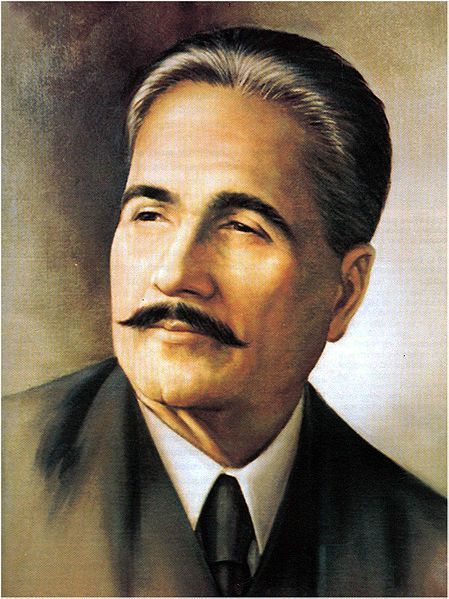
to ab logo ne karna ye hai k
ALLAMA IQBAL ki poetry pictures un ki baatey un key kahayalaat jitna aap ALLAMA IQBAL k baarey main Jaantey Hain yahan wo sab kuch post kar saktey hain *
tanveer6 21.12.12 - 12:25pm
Sir Allama Mohammad
Iqbal
Born
9 November 1877
Sialkot, Punjab, British
India
Died
21 April 1938 (aged
60)
Lahore, Punjab, British
India
Era
20th century
philosophy
Region
British India (now
Pakistan)
Main interests
Urdu poetry, Persian
poetry
Notable ideas
Two-Nation Theory,
Conception of
Pakistan
Influenced by
Rumi, Aristotle,
Ahmad Sirhindi,
Johann Wolfgang
von Goethe
, Friedrich
Nietzsche, Henri
Bergson, Maulana
Mohammad Ali
, Thomas Walker
Arnold
, Hegel[citation
needed]
Influenced
Pakistan
Movement
, Indian
independence
movement
, Khilafat
Movement,
Muhammad Ali
Jinnah
, Islamic Republic
of Pakistan
, Ali Shariati, Israr
Ahmed, Abul Ala
Maududi, Khalilullah
Khalili, Jawdat Said,
Bahadur Yar Jung
Website
allamaiqbal.com
*
tanveer6 21.12.12 - 12:29pm
Sir Muhammad Iqbal
(Urdu: )
(November 9, 1877
April 21, 1938), also
known as Allama
Iqbal (Urdu: ),
was a philosopher, poet
and politician[1] in
British India who is
widely regarded as
having inspired the
Pakistan Movement. He
is considered one of the
most important figures
in Urdu literature,[2]
with literary work in
both the Urdu and
Persian languages.[1][2]
Iqbal is admired as a
prominent classical poet
by Pakistani, Iranian,
Indian and other
international scholars of
literature.[3][4] Though
Iqbal is best known as
an eminent poet, he is
also a highly acclaimed
Muslim philosophical
thinker of modern
times.[1][4] His first
poetry book, Asrar-e-
Khudi, appeared in the
Persian language in
1915, and other books
of poetry include
Rumuz-i-Bekhudi,
Payam-i-Mashriq and
Zabur-i-Ajam. Amongst
these his best known
Urdu works are Bang-i-
Dara, Bal-i-Jibril, Zarb-i
Kalim and a part of
Armughan-e-Hijaz.[5] In
Iran and Afghanistan,
he is famous as Iqbl-e
Lhor ( )
(Iqbal of Lahore), and he
is most appreciated for
his Persian work.[6]
Along with his Urdu and
Persian poetry, his
various Urdu and English
lectures and letters
have been very
influential in cultural,
social, religious and
political disputes over
the years.[5]
In 1922, he was
knighted by King George
V,[6][7] giving him the
title Sir.[8]
While studying law and
philosophy in England,
Iqbal became a member
of the London branch of
the All India Muslim
League.[4][5] Later, in
one of his most famous
speeches, Iqbal pushed
for the creation of a
Muslim state in
Northwest India. This
took place in his
presidential speech in
the League's December
1930 session.[4][5] He
was very close to the
founder of Pakistan,
Mohammad Ali Jinnah.
[5]
In much of Southern
Asia and Urdu speaking
world, Iqbal is regarded
as the Shair-e-Mashriq
( ) (Poet of
the East).[9][10][11] He
is also called muf*akir-e-
Pakistan( )
(The Thinker of
Pakistan) and Hakeem-
ul-Ummat ( )
(The Sage of the
Ummah). The Pakistan
government officially
named him a national
poet.[4] His birthday
Ym-e Weldat-e
Muammad Iqbl (
) or
(Iqbal Day) is a public
holiday in Pakistan.[12]
In India he is also
remembered as the
author of the popular
patriotic song Saare
Jahaan Se Achcha.[13]
*
tanveer6 21.12.12 - 12:31pm
Personal life
Background
Iqbal was born in Sialkot
on 9 November 1877
within the Punjab
Province of British India
(now in Pakistan). His
forebears (grandparent)
were Kashmiri Pandits,
the Brahmins of the
Sapru clan from Kashmir
who converted to
Islam.[10][14] In the
19th century, when
Sikhs were taking over
rule of Kashmir, his
grandfather's family
migrated to Punjab.
Iqbal often mentioned
and commemorated
about his Kashmiri
Pandit Brahmin lineage
in his writings.[10]
*
tanveer6 21.12.12 - 12:34pm
Iqbal's father, Shaikh
Noor Mohammad, was a
tailor, not formally
educated but a religious
man.[6][15] Iqbal's
mother Imam Bibi was
a polite and humble
woman who helped the
poor and solved the
problems of neighbours.
She died on 9 November
1914 in Sialkot.[7][14]
Iqbal loved his mother,
and on her death he
expressed his feelings
of pathos in a poetic
form elegy.[6]
Who would wait
for me anxiously in
my native place?
Who would display
restlessness if my
letter fails to
arrive?
I will visit thy
grave with this
complaint:
Who will now think
of me in midnight
prayers?
All thy life thy love
served me with
devotion
When I became fit
to serve thee,
thou hast
departed.[6]
Iqbal was four years old
when he was admitted
to the mosque for
learning the Qur'an, he
learned the Arabic
language from his
teacher Syed Mir
Hassan, the head of the
madrassa and
professor of Arabic
language at Scotch
Mission College in
Sialkot, where Iqbal
completed matriculation
in 1893. He received
Intermediate with the
Faculty of Arts diploma
from Murray College
Sialkot in 1895.[7][10]
[16] The same year he
qualified for Bachelor of
Arts in philosophy,
English literature and
Arabic as his subjects
from Government
College Lahore
in 1897, and won the
Khan Bahadurddin F.S.
Jalaluddin medal as he
took higher numbers in
Arabic class.[7] In 1899,
he received Masters of
Arts degree from the
same college and had
the first place in Punjab
University, Lahore
.[7][10][16]
Iqbal had married three
times, in 1895 while
studying Bachelor of
Arts he had his first
marriage with Karim
Bibi, the daughter of a
Gujarati physician Khan
Bahadur Ata
Muhammad Khan,
through an arranged
marriage. They had
daughter Miraj Begum
and son Aftab Iqbal.
Later Iqbal's second
marriage was with
Sardar Begum mother
of Javid Iqbal and third
marriage with Mukhtar
Begum in December
1914.[7][9]
*
tanveer6 21.12.12 - 12:37pm
Higher education in
Europe
Iqbal was influenced by
the teachings of Sir
Thomas Arnold, his
philosophy teacher at
Government college
Lahore, Arnold's
teachings determined
Iqbal to pursue higher
education in West. In
1905, he traveled to
England for his higher
education. Iqbal qualified
for a scholarship from
Trinity College in
Cambridge and obtained
Bachelor of Arts in
1906, and in the same
year he was called to
the bar as a barrister
from Lincoln's Inn. In
1907, Iqbal moved to
Germany to study
doctorate and earned
PhD degree from the
Ludwig Maximilian
University
, Munich in 1908.
Working under the
guidance of Friedrich
Hommel, Iqbal published
his doctoral thesis in
1908 entitled: The
Development of
Metaphysics in Persia
.[10][17][18][19]
During Iqbal's stay in
Heidelberg, Germany in
1907 his German
teacher Emma
Wegenast taught him
about Goethe's Faust,
Heine and Nietzsche.
[20] During his study in
Europe, Iqbal began to
write poetry in Persian.
He prioritized it because
he believed he had
found an easy way to
express his thoughts.
He would write
continuously in Persian
throughout his life.[10]
*
tanveer6 21.12.12 - 12:40pm
Iqbal, after completing
his Master of Arts
degree in 1899, initiated
his career as a reader of
Arabic at Oriental
College and shortly was
selected as a junior
professor of philosophy
at Government College
Lahore, where he had
also been a student,
Iqbal worked there until
he left for England in
1905. In 1908, Iqbal
returned from England
and joined again the
same college as a
professor of philosophy
and English literature.
[21] At the same period
Iqbal began practicing
law at Chief Court
Lahore, but soon Iqbal
quit law practice, and
devoted himself in
literary works and
became an active
member of Anjuman-e-
Himayat-e-Islam
.[7] In 1919, he became
the general secretary of
the same organisation.
Iqbal's thoughts in his
work primarily focus on
the spiritual direction
and development of
human society,
centered around
experiences from his
travels and stays in
Western Europe and the
Middle East. He was
profoundly influenced by
Western philosophers
such as Friedrich
Nietzsche, Henri
Bergson and Goethe.[6]
[20]
The poetry and
philosophy of Mawlana
Rumi bore the deepest
influence on Iqbal's
mind. Deeply grounded
in religion since
childhood, Iqbal began
intensely concentrating
on the study of Islam,
the culture and history
of Islamic civilization
and its political future,
while embracing Rumi
as his guide.[6] Iqbal
would feature Rumi in
the role of guide in
many of his poems.
Iqbal's works focus on
reminding his readers of
the past glories of
Islamic civilization, and
delivering the message
of a pure, spiritual focus
on Islam as a source for
sociopolitical liberation
and greatness. Iqbal
denounced political
divisions within and
amongst Muslim
nations, and frequently
alluded to and spoke in
terms of the global
Muslim community or
the Ummah.[6][22]
Iqbal poetry has been
translated into many
European languages, at
the time when his work
was famous during the
early part of the 20th
century.[4] Iqbals
Asrar-i-Khudi and Javed
Nama were translated
into English by R A
Nicholson and A J
Arberry respectively.[4]
[11]
*
tanveer6 21.12.12 - 12:42pm
In 1933, after returning
from a trip to Spain and
Afghanistan, Iqbal had
suffered from a
mysterious throat
illness.[23] He spent his
final years helping
Chaudhry Niaz Ali Khan
to establish the Dar ul
Islam Trust Institute
at Jamalpur estate near
Pathankot,[24][25]
where studies in
classical Islam and
contemporary social
science were plan to be
subsidised, and Iqbal
also advocated the
demand for an
independent Muslim
state.
*
tanveer6 21.12.12 - 12:45pm
Iqbal ceased practising
law in 1934 and was
granted pension by the
Nawab of Bhopal. In his
final years he
frequently visited the
Dargah of famous Sufi
Hazrat Ali Hujwiri in
Lahore for spiritual
guidance. After
suffering for months
from his illness, Iqbal
died in Lahore on 21
April 1938.[5][10]His
tomb is located in
Hazuri Bagh, the
enclosed garden
between the entrance
of the Badshahi Mosque
and the Lahore Fort, and
official guards are
provided by the
Government of
Pakistan .
*
tanveer6 21.12.12 - 12:48pm
Iqbal is commemorated
widely in Pakistan,
where he is regarded as
the ideological founder
of the state. His
Tarana-e-Hind is a song
that is widely used in
India as a patriotic song
speaking of communal
harmony. His birthday is
annually
commemorated in
Pakistan as Iqbal Day, a
national holiday. Iqbal is
the namesake of many
public institutions,
including the Allama
Iqbal Campus Punjab
University in Lahore, the
Allama Iqbal Medical
College
in Lahore, Iqbal Stadium
in Faisalabad, Allama
Iqbal Open University
in Pakistan, the Allama
Iqbal International
Airport
in Lahore, the Allama
Iqbal hall in Nishtar
Medical College in Multan
and Gulshan-e-Iqbal
Town in Karachi.
The government and
public organizations
have sponsored the
stablishment of
educational institutions,
colleges and schools
dedicated to Iqbal, and
have established the
Iqbal Academy to
research, teach and
preserve the works,
literature and
philosophy of Iqbal.
Allama Iqbal Stamps
Society established for
the promotion of
Iqbaliyat in philately and
in other hobbies. His son
Javid Iqbal has served
as a justice on the
Supreme Court of
Pakistan
. Javaid Manzil was the
last residence of Allama
Iqbal.[26]
*
tanveer6 21.12.12 - 12:50pm
Efforts and
influences
Political
Further information:
Pakistan Movement
While dividing his time
between law practice
and poetry, Iqbal had
remained active in the
Muslim League. He did
not support Indian
involvement in World
War I and remained in
close touch with Muslim
political leaders such as
Maulana Mohammad Ali
and Muhammad Ali
Jinnah. He was a critic
of the mainstream
Indian National
Congress , which he
regarded as dominated
by Hindus and was
disappointed with the
League when during the
1920s, it was absorbed
in factional divides
between the pro-British
group led by Sir
Muhammad Shafi and
the centrist group led
by Jinnah *
tanveer6 21.12.12 - 12:52pm
NOW STARTING POETRY *
tanveer6 21.12.12 - 01:01pm
Ham Mashriq K
Musalmanon Ka Dil
Magrib Mein Ja Atka
Hai
ham mashriq k
musalmanon ka dil
magrib mein ja atka
hai
wahan ar sab
billori hai, yahan ek
purana matka hai
is daur mein sab mit
jayenge, han baqi wo
rah jayega
jo qayam apni rah pe
hai, aur pakka apni hat
ka hai
ae shaikh-o-brahman
sunte ho kya ahl-e-
basirat kahte hain
gardon ne kitani
bulandi se un Qoumon ko dey patka hai *
tanveer6 22.12.12 - 08:29am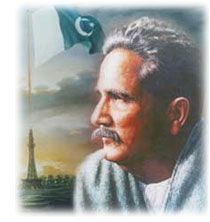 *
*
tanveer6 22.12.12 - 08:31am
ALLAMA IQBAL
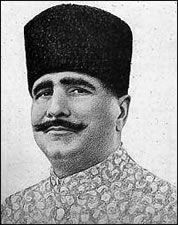 *
*
tanveer6 22.12.12 - 08:32am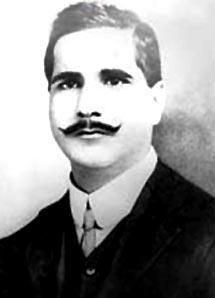 *
*
tanveer6 22.12.12 - 08:33am
BEST OF IQBAL
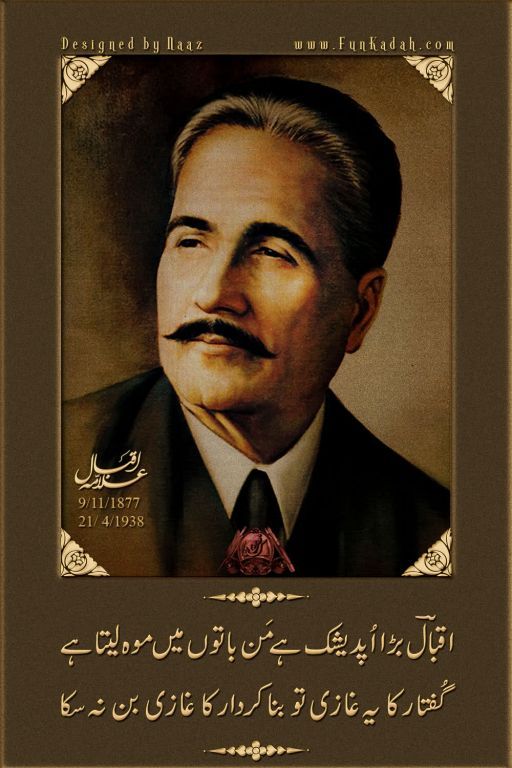 *
*
tanveer6 22.12.12 - 08:34am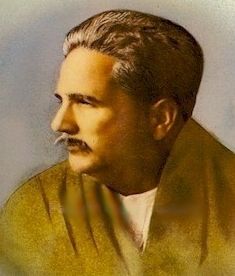 *
*
tanveer6 22.12.12 - 08:36am
ALLAMA MOHAMMAD IQBAL
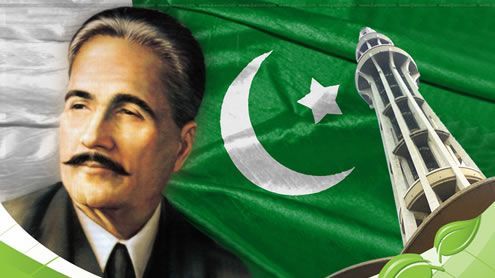 *
*
tanveer6 22.12.12 - 08:38am *
*
